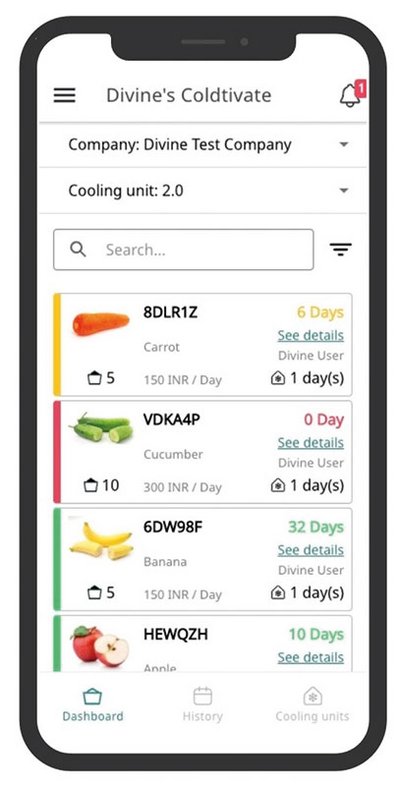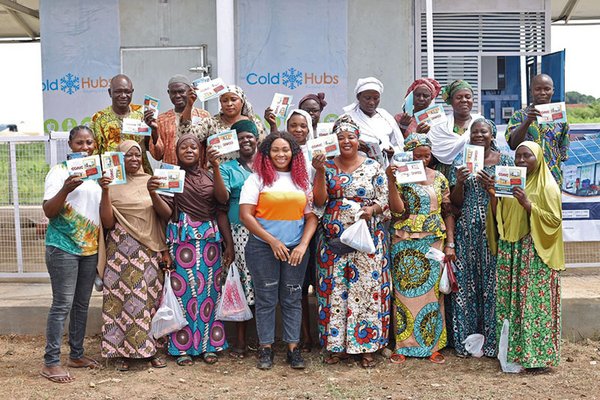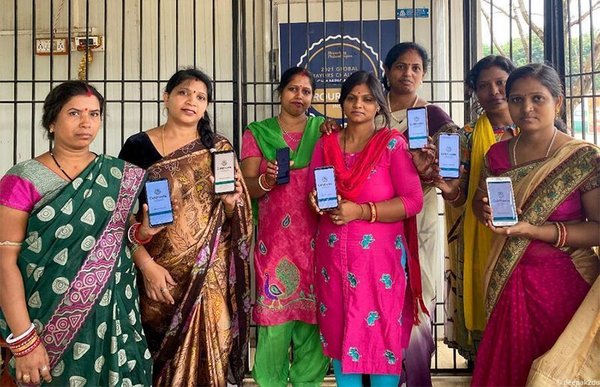 Download this article in magazine layout
Download this article in magazine layout
- Share this article
- Subscribe to our newsletter
Bridging the cooling gap through digitalisation
Horticultural food loss is a significant issue in low and lower-middle income countries, with losses in India at 30-40 per cent and in Nigeria at 50-60 per cent. These losses are due to fragmented cold chains, poor post-harvest management and limited market access, resulting in crop damage and spoilage. Limited storage options force farmers into distress selling, particularly impacting women and marginalised farmers who lack access to storage, resources, and training. These access gaps lead to reduced productivity and profits, perpetuating cycles of poverty and dependence.
Entrepreneurs are addressing these challenges by creating decentralised cold rooms with a Cooling-as-a-Service (CaaS) model. This approach removes financial and technological barriers, enabling users to pay a daily fee based on the amount of stored produce while the cooling companies handle equipment ownership and maintenance. However, a lack of awareness about cold storage benefits, inefficient cold room management to accommodate crop diversity and ineffective financial tracking hinder the scalability of these solutions.
A solution for inclusive access
In a bid to advance the adoption of cooling practices among farmers, in 2021, the Swiss not-for-profit BASE Foundation (formerly the Basel Agency for Sustainable Energy) and the SymBioSys Group of the Swiss Federal Laboratories for Materials Science and Technology (Empa) partnered to promote sustainable cooling in agriculture, launching “Your Virtual Cold Chain Assisstant” (also see Box at the end of the article). “Your VCCA” combines CaaS, digitalisation and awareness-raising efforts to combat post-harvest losses and enhance farmer livelihoods.
One key pillar of the initiative is the design of a free-to-use, data science-based mobile application, “Coldtivate”, which has been co-developed with the support of local cooling companies and users to ensure that operations in cold rooms are more efficient and transparent. The main components of the application are:
Digitalising inventory management. Coldtivate simplifies inventory management by replacing error-prone manual processes. Cold room operators, who assist farmers with crate storage and retrieval, enter crate details into the app, including commodity type, weight and harvest date. The app offers insights on commodity distribution within the cold room, optimal temperatures and occupancy rates. It calculates fees during check-out, ultimately optimising decentralised cold room management.

The dashboard shows room inventory, including quantity, price, crates, owner and storage duration. Colour-coding and a day count in the top right corner of each item represent the remaining storage life. Users and operators are alerted as crates near the end of their storage life.
Digital twins and storage life prediction. To instil trust in cold storage solutions, farmers need to see how these facilities preserve their produce’s quality. The Coldtivate app employs “digital fruit twins”, artificial models developed by Empa that virtually simulate crop ageing (see Photo above). These models, fuelled by information about the crop initial quality and sensor data on room temperature, predict how long each crate can be stored, adjusting for temperature changes. The app displays this information on smartphones in local languages, indicating the days remaining until pickup. SMS notifications are used for farmers without smartphones, ensuring they are alerted before their produce spoils.
Market price predictions: Coldtivate empowers farmers to boost profits by using open-source market data to display historical prices and predict commodity prices in India and Nigeria. This enables strategic sales timing and location, and fair rate negotiations, and it reduces the risk of distress selling, with potential price drops of up to 75 per cent.
Levelling the playing field – your VCCA’s gender-focused approach
Female smallholder farmers in the two countries face challenges in land ownership, wage equality, and financial access. They lack support, training, and recognition, with only eight per cent of female-headed households in Nigeria accessing extension services. Cultural barriers limit integration into the agricultural value chain and financial independence.
The case studies in the Box below illustrate how “Your VCCA” helps improve access to sustainable cooling solutions for women. Female-staffed cooling rooms facilitate cultural inclusivity and knowledge sharing among their users. Additionally, the training materials developed as part of the initiative have been co-designed with all involved stakeholders and translated into local languages to make them more accessible, with special care taken in depicting women as empowered market participants.
To date, more than 230 tonnes of produce (10,000+ crates) belonging to 400+ cooling users has been registered in the Coldtivate app. The solution has helped reduce post-harvest loss in the two countries by approximately 20 per cent, increase the revenue of farmers by 20 per cent and, thanks to the use of solar power technologies, as opposed to conventional fossil fuel-based technologies, avoid 193 tonnes of CO2 emission a year.
Women self-help groups redefine cold room management
In India, the company Koel Fresh has been training members of a women’s self-help group to operate a five metric tonne cold room near the VSS Market in Rourkela, Odisha, using tools like Coldtivate. This location was chosen to ensure women farmers’ safety and convenient access. The initiative empowers women with technical skills and creates job opportunities within self-help groups.
A study by Your VCCA and Koel Fresh revealed that before the intervention, female farmers in Odisha had sold less produce at market prices than their male counterparts (50.8 % vs. 60 %), incurring higher losses. In response, the self-help group launched a programme to aggregate crops stored in the cold room for fair wholesale deals, collaborating with local businesses. The presence of female operators in the cold room has enhanced its cultural accessibility, increasing usage among female farmers.
Regular female cold room users receive specialised training, becoming cold-room champions who educate the community on how and why to use a cold room. This peer-to-peer approach allows for equity in knowledge dissemination, and first-hand narratives experiences build trust in cooling solutions. Through this approach, the room’s users have witnessed a drop in crop spoilage from 17 to 4 per cent, and a boost in revenues by 29.6 per cent.
The significant increase in revenue for cold room users allows female farmers to gain better payment for their crops, a change from historical norms.
Community as a pathway to inclusivity
The cooling service provider ColdHubs, which offers modular, solar-powered walk-in cold rooms, primarily employs female cold room operators at its 58 facilities across Nigeria, collaborating with local female leaders, such as the iyál ójà in the Yoruba community, to identify women confronting socio-economic difficulties and facilitate their empowerment. The female operators are offered training on crop care and managing the cold rooms using Coldtivate. The trainers demonstrate cultural proficiency, integrating with the community and fostering a close working relationship for effective monitoring of the operators’ needs.
In addition to targeted programmes for women, ColdHubs also holds joint gender sessions for knowledge exchange and to enhance women’s visibility in the agricultural supply chain. These efforts have resulted in nearly 1,500 regular female cold room users.
Post-harvest management training in Aje Market, Osun State, Nigeria. Photo: ColdHubs
The road to scalability
Companies face a challenge in achieving high utilisation rates to quickly recoup their cold room investments, ensuring business profitability and sustainability. Their primary revenue source is the daily storage fee charged to cooling users per crate, underscoring the importance of room utilisation. To recover costs for a 3 metric ton cold room in 1.5 to 2 years, companies charging around 0.5 USD/ crate/ day need an average room occupancy of approximately 60 per cent daily. However, farmers often face hurdles like uncertainty in sales and high transportation expenses when contemplating cold storage, leading them to choose immediate post-harvest sales through intermediaries at lower rates.
Expanding cold room capacity depends on a company’s ability to secure additional funding for establishing new facilities. Small and medium-sized enterprises commonly struggle to attract impact investments because of their limited capacity to substantiate economic, environmental and social impact with reliable performance data. To accelerate the adoption of cold storage and address these challenges, Your VCCA is actively working to establish market connections for farmers and providing transparent tracking of company impact through data from Coldtivate. One significant effort includes the development of an impact dashboard, which allows cooling companies to oversee their business performance across different cold rooms and time periods. It also enables them to showcase key indicators to external stakeholders, demonstrating business viability and attracting investments.
Your VCCA’s innovative solution enhances sustainable food systems, empowering smallholder farmers, improving food security, and reducing resource losses. The positive reception suggests potential for global application. Coldtivate streamlines multi-commodity cold storage for cooling companies world-wide, with ongoing efforts to open-source its code for seamless integration with third-party apps.
Your VCCA’s Partners
“Your Virtual Cold Chain Assistant” was launched in India with support from the Inclusive Growth and Recovery Challenge Initiative of the platform Data.org. It has since been replicated in Nigeria, financed with contributions from the Fund for the Promotion of Innovation in Agriculture (i4Ag), which is commissioned by the German Federal Ministry for Economic Cooperation and Development (BMZ). The development of the impact dashboard was supported by the Swiss-based Climate Ledger Initiative, with financial support from the Swiss Agency for Development and Cooperation (SDC).
Simran Singh specialises in mainstreaming gender perspectives in climate finance models at the BASE Foundation in Basel, Switzerland. She leads capacity-building efforts for Your VCCA.
Celina Schelle is a Climate Finance & Adaptation Specialist at BASE Foundation, focusing on business model innovation for building resilient communities.
Roberta Evangelista is a Senior Digitalisation Specialist at BASE Foundation who is passionate about leveraging the power of data to benefit communities and the planet.
Contact: celina.schelle@energy-base.org
More information:
References:
Hegazy, R. (2013). Post-harvest situation and losses in India. High Court of Karnataka-Bengaluru Bench: WP, 24739, 2012.
Oseni, G., Corral, P., Goldstein, M., & Winters, P. (2015). Explaining gender differentials in agricultural production in Nigeria. Agricultural Economics, 46(3), 285-310.
Thomas, A., & Turk, R. (2023). Food Insecurity in Nigeria: Food Supply Matters.




